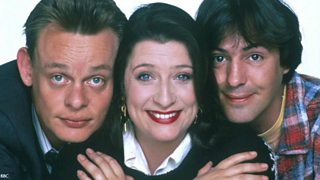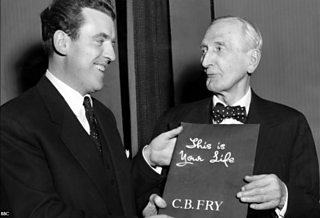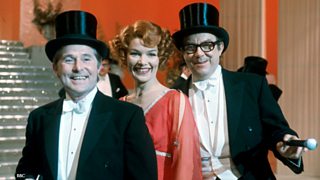
Sitcom Men Behaving Badly straddled the TV networks
With the news that ��������1 Saturday evening stalwart The Voice is to transfer to ITV after its next series, I was reminded of the fact that this is far from the first time that a �������� show has migrated to another channel – and the process has also happened in the other direction.
One of the reasons this can happen of course is that the �������� (or any other broadcaster) does not necessarily hold all the rights to given shows. The Voice was only the latest in a long line of formats which were American in origin, dating back to the early days of game and panel shows like What’s My Line? which was devised by the prolific partnership of Mark Goodson and Bill Todman and featured the
Following the original version's end in 1963, the �������� on ��������2 from 1973-4 with David Jacobs in the chair, and 10 years after that ITV bought the format and ran the show until 1990, with a regional revival from 1994 to 1996.
The ITV version of What's My Line? was chaired by the host of the original �������� series, Eamonn Andrews, who had also been the presenter of . This was another US format, devised by Ralph Edwards, which debuted on �������� television on 29th July 1955. In this episode, to Andrews’ surprise, he turned out to be the subject of the programme.
This is Your Life became a highly successful programme for the ��������, running for nine years, with only one major upset when footballer Danny Blanchflower refused to be on the programme. The start of the programme was pre-recorded by this time, so the �������� was able to show a stand-by edition in its place.
The �������� run ended in 1964 when Andrews was offered his own chat show on ITV franchise ABC, but after that company was merged with Rediffusion London in 1967 to form Thames Television, Andrews returned as host of a revived version of the show.
He remained presenter from 1969 until his death in 1987, when Michael Aspel replaced him. ITV dropped the show in 1994, but it was still made by Thames as an independent producer.

Eamonn Andrews fronted This is Your Life on both the �������� and ITV
Not every programme is based around a format of course, and many shows are just a vehicle for the talents of a particular star or act. Over the course of a television career many artists will work for both �������� and other broadcasters. In some cases, the format of the show will change very little, in others, for example where someone has become famous in their own right through a formatted show, it may not be possible to translate the format as it still belongs to the original company.
Occasionally the whole ‘package’ may be available. In a sense this happened with when they moved over to the �������� in 1968, bringing with them their writers Dick Hills and Sid Green. The resulting �������� shows in their first colour series were not too dissimilar to the ITV version that had run since 1961. However, this was not their first, nor their last switch.
Their was Running Wild for the �������� (then the only channel) in 1954, and after its poor reception their next regular outing was as part of the ensemble cast of Double Six in 1957 (not counting their many radio series). Otherwise they made only occasional appearances until a change in management at the start of the 60s enabled them to secure a deal for their own ATV show Two of a Kind.
Following their great success at the ��������, in 1978 Morecambe and Wise decided it was time to ring the changes again, and signed with Thames Television. They were not at first able to secure the services of Eddie Braben, the inspired and legendary Liverpudlian comedy writer who had taken their comedy to another level from the 1969 series onwards, as he was still contracted to the ��������. Together with Eric Morecambe’s failing health these final ITV shows marked a decline in quality.
As well as individual artists, occasionally comedy programmes have transferred channels. is one example – originally written for the �������� at the start of the 60s by Ronald Wolfe and Ronald Chesney , it was brought back by ITV in the late 70s, with the original main stars Peter Jones and Miriam Karlin.
Men Behaving Badly, first shown on ITV in 1992, was dropped by the channel after two series, but independent producers Hartswood Films managed to sell it to the ��������. As well as allowing it the customary extra minutes per episode (�������� sitcoms are generally 30 minutes long, while ITV have to allow several minutes of a half-hour slot for advertisements), the �������� scheduled it later in the evening, allowing for more and situations. Over a further four series and specials the show acquired wide following, although it is perhaps slightly lost in the mists of time now, nearly 20 years after it ended in 1998.
As well as commissioning its own new episodes, the �������� also repeated the 2nd series, originally shown on ITV, which was the first to feature Neil Morrissey as Tony alongside Martin Clunes, Caroline Quentin and Leslie Ash – the first series featured Harry Enfield as Dermot, who left after deciding he felt out of place in a sitcom.
after two runs on the �������� in the 60s and 70s, was revived by ITV in 1981 with a slight title change to Till Death… It was unsuccessful, but Alf Garnett and his family returned a second time in the ��������’s which ran from 1985 to 1992. Alf made several appearances in other shows on his own, one of these being ITV’s 1980 one-off The Thoughts of Chairman Alf at Christmas, another being one of LWT’s An Audience with… series.

Morecambe and Wise were famous side-switchers
Several chat shows have also made the transition from one channel to another. having fallen out with �������� management in 1970, took his eponymous programme (successor to Dee Time) to London Weekend Television, but his series there was short lived.
Michael Parkinson, having started his television career as a producer and presenter with Granada, move to the �������� as a reporter on 24 Hours before in 1971. He left again to join TV-am in 1982, and also presented Parkinson One to One for Yorkshire TV before Parkinson was resurrected in 1998 on ��������1. After a dispute over scheduling in 2004, the show went over to ITV, where it ran for another three years.
Russell Harty had an almost complimentary career path. He worked a �������� radio producer before presenting ITV’s arts series Aquarius, which led to his chat show Russell Harty Plus, later just Russell Harty. In 1980 he moved back to the �������� for his show (just Harty from 1983), perhaps best remembered for the incident where he was assaulted by Grace Jones (still not as embarrassing as Michael Parkinson being attacked by Rod Hull and Emu on his own show some years before).
In more recent years, Jonathan Ross, having started on Channel 4 in The Last Resort in 1987, had been an occasional holiday relief on Terry Wogan’s chat show and presenter of the one-to-one interview series Jonathan Ross Presents, as well as presenting his Radio 2 show since 1999 and co-hosting Comic Relief, before he made for the �������� in 200 . Ross then fronted a number of other programmes including the Film series (1999-2010), and programmes about his interest in cult movies and comic books. In 2010 after various controversies, culminating in his suspension over the Russell Brand ‘prank’ call scandal, Ross decided not to renew his contract when it expired, and the following year began his current ITV chat show.
Another area that has seen a large number of programmes swapping channels is in the field of bought-in series. Many of these may be US series which had no original connection with a particular British broadcaster, and the same has happened with other countries’ output, notably Neighbours, originally shown in the UK on ��������1 from 1986 before it moved to Channel Five in 2008.
However some ITV programmes from the 1960s, cult favourites such as Gerry Anderson’s puppet series Thunderbirds and Captain Scarlet and the Mysterons, live-action series The Prisoner, Man in a Suitcase and The Champions to name a few, were also purchased by the �������� in the 1990s and 2000s, and were shown either in early evening ��������2 slots or on ��������4.
As The Voice shows, in a world where TV formats are internationally exchangeable properties, and rights are not always exclusively tied to one broadcasting company, we have not have seen the last of shows that jump from one channel to another…
